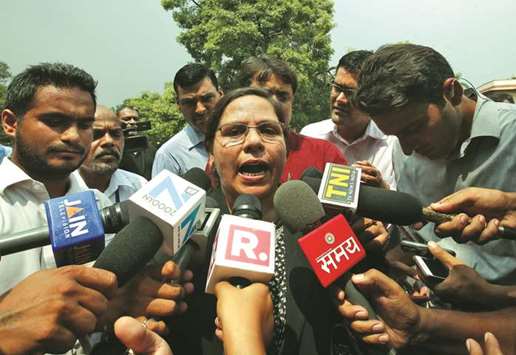The Supreme Court yesterday banned the controversial centuries-old practice of instant triple talaq among Indian Muslims.
The court ruled that the practice was both unconstitutional and un-Islamic.
Victims including Shayara Bano, whose husband used triple talaq to divorce her in 2015, had approached India’s highest court to ask for a ruling.
A panel of five male judges from India’s major faiths – Hinduism, Christianity, Islam, Sikhism and Zoroastrianism – said triple talaq was “not integral to religious practice and violates constitutional morality”.
They said it was “manifestly arbitrary” to allow a man to “break down (a) marriage whimsically and capriciously”.
“What is sinful under religion cannot be valid under law,” said the judges.
Bano, who suffered a nervous breakdown after her divorce, said it was a “historic occasion” for Muslim women.
“I appeal to the people to not politicise this issue and accept Supreme Court’s verdict on triple talaq,” she told reporters outside the court.
“I have felt the pain when family breaks. I hope no one has to go through this situation in future.”
India was one of the few nations that permitted triple talaq, which does not constitute legal divorce in neighbouring Pakistan or Bangladesh.
Muslim women say they have been divorced by their husbands via Skype and even WhatsApp messages.
India’s constitution allows its 1.25bn citizens to be governed by their own religious laws when it comes to marriage, divorce and property inheritance.
But Prime Minister Narendra Modi’s government wants to bring in a common civil code for all religious groups, a move it says will strengthen national unity.
Modi hailed the Supreme Court ruling as “historic”, saying in a tweet, “it grants equality to Muslim women and is a powerful measure for women empowerment”.
But the All India Muslim Personal Law Board (AIMPLB), which claims to represent India’s 180mn Muslims, said the court case had been used to malign them.
The board had argued that the practice was “reprehensible” but should not be a matter for the courts or the government.
“This was made into a media campaign to malign the image of Muslims. We knew the court was in no mood to allow triple talaq,” its general secretary Moulana Mohamed Wali Rehmani said.
“All laws including modern laws have flaws and are misused. We were working on remedies and have suggested measures.”
Rehmani said the board would continue to work with the community for reform and may challenge the ruling.
The board had earlier accused Modi of triggering an “internal war” in India with plans to introduce a common civil code for all religions.
The judges deliberated for three months on the case before reaching their verdict, which was agreed by three of the five on the panel.
Chief Justice J S Khehar, who is due to retire later this month, was one of the two dissenting voices.
“In view of the different opinions recorded, by a majority of 3:2 the practice of talaq-e-biddat – triple talaq – is set aside,” the panel comprising Khehar, Kurian Joseph, Rohinton F Nariman, U U Lalit and Abdul Nazeer said in the concluding para of the 395-page ruling.
Nariman and Lalit, who were part of the majority judgment, said: “Given that triple talaq is instant and irrevocable, it is obvious that any attempt at reconciliation between the husband and wife by two arbiters from their families, which is essential to save the marital tie, cannot ever take place.
“...This being the case, it is clear that this form of talaq is manifestly arbitrary in the sense that the marital tie can be broken capriciously and whimsically by a Muslim man without any attempt at reconciliation so as to save it.

Farha Faiz, a lawyer, speaks with the media after the Supreme Court delivered its verdict in New Delhi yesterday.
